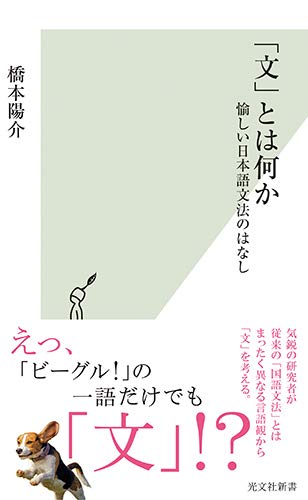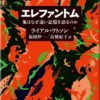
面白く読みました。ただ、読み始めから気になっていたのですが、著者が何のために言語学をやっているのかわかりません。言語学が楽しいから?意識・思考とは何か、人間とは何かを知りたいから?文学を楽しみたいから?それだけなら趣味でやってください。
著者も言ってはいますが、書き言葉と話し言葉は別の言葉です。というより次元が違うのです。それを同列に扱おうとするから、文法も言語学も混乱してしまいます。たしかに、小説は話し言葉に近い(口承文化に近い)ですが、文字にした時点で時空を超えて存在しますから書き言葉です。識字文化を知ってしまった私たちには理解するのが難しいですが。むしろ、口承文化は理性的な理解ができないところにその本質があるからです。
著者が生まれた頃には当然家にテレビがあったと思うし、そこからは「標準語」という作られた言語が流れていたはずです。テレビゲームもすでにありました。母親は埼玉弁を話していたかもしれませんが。母語というのは母親から伝わり、母親の胸の鼓動とともに豊かな口承文化を伝えてくれます。それをしっかりと身に付けてから、識字文化に入らないとなりません。自己意識がちゃんと育たないからです(「本が死ぬところ暴力が生まれる―電子メディア時代における人間性の崩壊」参照)。
自我ができないとはどういうことでしょうか。例えば、犬を名前で呼んだとします。犬は賢いですから、呼び主の方に来ます。犬には意識のようなものがあると思います。ただし、その思考は犬語ですが。犬は「自分の名前が呼ばれたから」来るのでしょうか。そうではないと言われています。「他の犬ではない自分」というのがないからです。ですから「名前を呼ばれたから」来るのです。いいえ、多分「名前」という概念もないでしょうから、「呼ばれたから」来るのです。それで十分なのです。「自分」というのは必要ではないからです。「仲間」というのは必要かもしれません。「敵」が必要なのと同じで「仲間」は必要でしょう。
非識字者(口承文化に生きる人)には同様に(識字者が言う)自分というものを持っていないのです。時間概念もありません。現在と過去と未来が渾然と存在しているのです。では半識字者はどうでしょう。「半識字者」というのは、口承文化を身に付けずに識字文化に接した人です。その人達はアメリカのギャングが言うように「I」ではなく「We」を使います。英語ではかならず主語をつけるので「We」が必要なのです。Weは「仲間」という(疑似)共同体を表します。それ以外は「敵」なわけです。
日本でも、半グレなどが自分のことを「俺たち」「私たち」と呼ぶのを聞いたことがあるでしょう。日本語で主語、特に一人称は必要でないことが多いのですが。つまり「仲間」、(疑似)共同体が主語になるのです。主語をつけるのは、識字文化(=電子メディア)の影響です。仲間以外はすべて「敵」です。つまり、本来の自己意識(自分というもの)を持てないのです。いや、持つことを恐れているのかもしれません。自分を持つことは、自分が置かれている環境・社会状況を客観視することを強制するからです。貧困や家庭内暴力、愛されることのなかった自分等を思い出すことは辛いことです。そんなことをするくらいならテレビゲームやネットゲームをしていたほうが楽しいのですから。あるいは無批判に(自分の意見を持つことなく)テレビや映画を見ることも。自分を持てないのが決して半グレ集団だけでなく、先進国の多くの人々に当てはまるのが分かるでしょう。
「私たち」というのは、イデオロギーとしての意図的な発言であることも多いのですが、本当の「共同体」を前提として発言されていないときは気をつける必要があります。自分の意見を言うときは「私は」と言いましょう。その発言は「客観性」(科学性、西洋論理学的)の仮面をつけないので弱く聞こえますが、仮面をつけて自分を騙すよりはいいのではないでしょうか。
⟨impressions⟩
I read it interestingly. However, I was curious from the beginning of reading, but I do not know what the author is doing linguistics for. Because linguistics is fun? Do you want to know what consciousness / thinking is and what humans are? Do you want to enjoy literature? If that's all, please do it as a hobby.
As the author says, written and spoken language are different words. Rather, the dimensions are different. Grammar and linguistics get confused because we try to treat them in the same line. It is true that a novel is close to spoken language (close to oral culture), but it is a written language because it exists beyond space-time when it is written. It's difficult for us who know the literacy culture to understand. Rather, oral culture has its essence where it cannot be understood rationally.
By the time the author was born, I think there was a television at home, and from there there must have been a language created called "standard language." There was already a video game. My mother may have been talking about Saitama dialect. The mother tongue is transmitted from the mother and conveys the rich oral culture along with the heartbeat of the mother. You have to learn it well before you enter the literacy culture. This is because self-consciousness does not grow properly (" Violence where the book dies Born-Collapse of humanity in the age of electronic media ).
What does it mean to be unable to ego? For example, suppose you call a dog by name. The dog is smart, so he comes to the caller. I think dogs have something like consciousness. However, that thought is in dog language. Do dogs come "because their name is called"? It is said that this is not the case. Because there is no such thing as "I am not another dog." That's why they come "because they called their name." No, it probably doesn't even have the concept of a "name", so it comes "because it was called". That's enough. You don't need to be yourself. "Friends" may be necessary. Just as you need an "enemy", you need a "friend".
Similarly, illiterate people (people who live in oral culture) do not have themselves (as literate people say). There is no concept of time. The present, the past, and the future exist in abundance. But what about semi-literate people? A "semi-literate person" is a person who has come into contact with literacy culture without having acquired oral culture. They use "We" instead of "I" as American gangs say. In English, the subject is always attached, so "We" is necessary. We stands for a (pseudo) community called "companies". Other than that, they are "enemy".
Even in Japan, you may have heard hangures call themselves "us" and "us". In Japanese, the subject, especially the first person, is often not needed. In other words, "companion" and (pseudo) community are the subjects. The subject is the influence of literacy culture (= electronic media). All but friends are "enemy". In other words, you cannot have the original self-consciousness (yourself). No, I may be afraid to have it. Having yourself forces you to have an objective view of the environmental and social conditions in which you are located. It's hard to remember poverty, domestic violence, and ourselves who were never loved. It's more fun to play video games and internet games than to do that. Or watch TV or movies without criticism (without having your own opinion). You will find that not having yourself is not just the hangure group, but many people in developed countries.
"We" are often intentional statements as an ideology, but you need to be careful when you are not speaking on the premise of a true "community". When you give your opinion, say "I". That statement sounds weak because it doesn't wear a mask of "objectivity" (scientific, Western logic), but I think it's better than wearing a mask and deceiving oneself.
I read it interestingly. However, I was curious from the beginning of reading, but I do not know what the author is doing linguistics for. Because linguistics is fun? Do you want to know what consciousness / thinking is and what humans are? Do you want to enjoy literature? If that's all, please do it as a hobby.
As the author says, written and spoken language are different words. Rather, the dimensions are different. Grammar and linguistics get confused because we try to treat them in the same line. It is true that a novel is close to spoken language (close to oral culture), but it is a written language because it exists beyond space-time when it is written. It's difficult for us who know the literacy culture to understand. Rather, oral culture has its essence where it cannot be understood rationally.
By the time the author was born, I think there was a television at home, and from there there must have been a language created called "standard language." There was already a video game. My mother may have been talking about Saitama dialect. The mother tongue is transmitted from the mother and conveys the rich oral culture along with the heartbeat of the mother. You have to learn it well before you enter the literacy culture. This is because self-consciousness does not grow properly (" Violence where the book dies Born-Collapse of humanity in the age of electronic media ).
What does it mean to be unable to ego? For example, suppose you call a dog by name. The dog is smart, so he comes to the caller. I think dogs have something like consciousness. However, that thought is in dog language. Do dogs come "because their name is called"? It is said that this is not the case. Because there is no such thing as "I am not another dog." That's why they come "because they called their name." No, it probably doesn't even have the concept of a "name", so it comes "because it was called". That's enough. You don't need to be yourself. "Friends" may be necessary. Just as you need an "enemy", you need a "friend".
Similarly, illiterate people (people who live in oral culture) do not have themselves (as literate people say). There is no concept of time. The present, the past, and the future exist in abundance. But what about semi-literate people? A "semi-literate person" is a person who has come into contact with literacy culture without having acquired oral culture. They use "We" instead of "I" as American gangs say. In English, the subject is always attached, so "We" is necessary. We stands for a (pseudo) community called "companies". Other than that, they are "enemy".
Even in Japan, you may have heard hangures call themselves "us" and "us". In Japanese, the subject, especially the first person, is often not needed. In other words, "companion" and (pseudo) community are the subjects. The subject is the influence of literacy culture (= electronic media). All but friends are "enemy". In other words, you cannot have the original self-consciousness (yourself). No, I may be afraid to have it. Having yourself forces you to have an objective view of the environmental and social conditions in which you are located. It's hard to remember poverty, domestic violence, and ourselves who were never loved. It's more fun to play video games and internet games than to do that. Or watch TV or movies without criticism (without having your own opinion). You will find that not having yourself is not just the hangure group, but many people in developed countries.
"We" are often intentional statements as an ideology, but you need to be careful when you are not speaking on the premise of a true "community". When you give your opinion, say "I". That statement sounds weak because it doesn't wear a mask of "objectivity" (scientific, Western logic), but I think it's better than wearing a mask and deceiving oneself.
[出演者(プロフィール)]
橋本/陽介
1982年埼玉県生まれ。お茶の水女子大学基幹研究院助教。慶應義塾大学大学院文学研究科中国文学専攻博士課程単位取得。博士(文学)。専門は、中国語を中心とした文体論、テクスト言語学
えっ、「ビーグル!」の一語だけでも「文」!?気鋭の研究者が従来の「国語文法」とはまったく異なる言語観から「文」を考える。
[ ISBN-13 : 978-4334044886 ]


